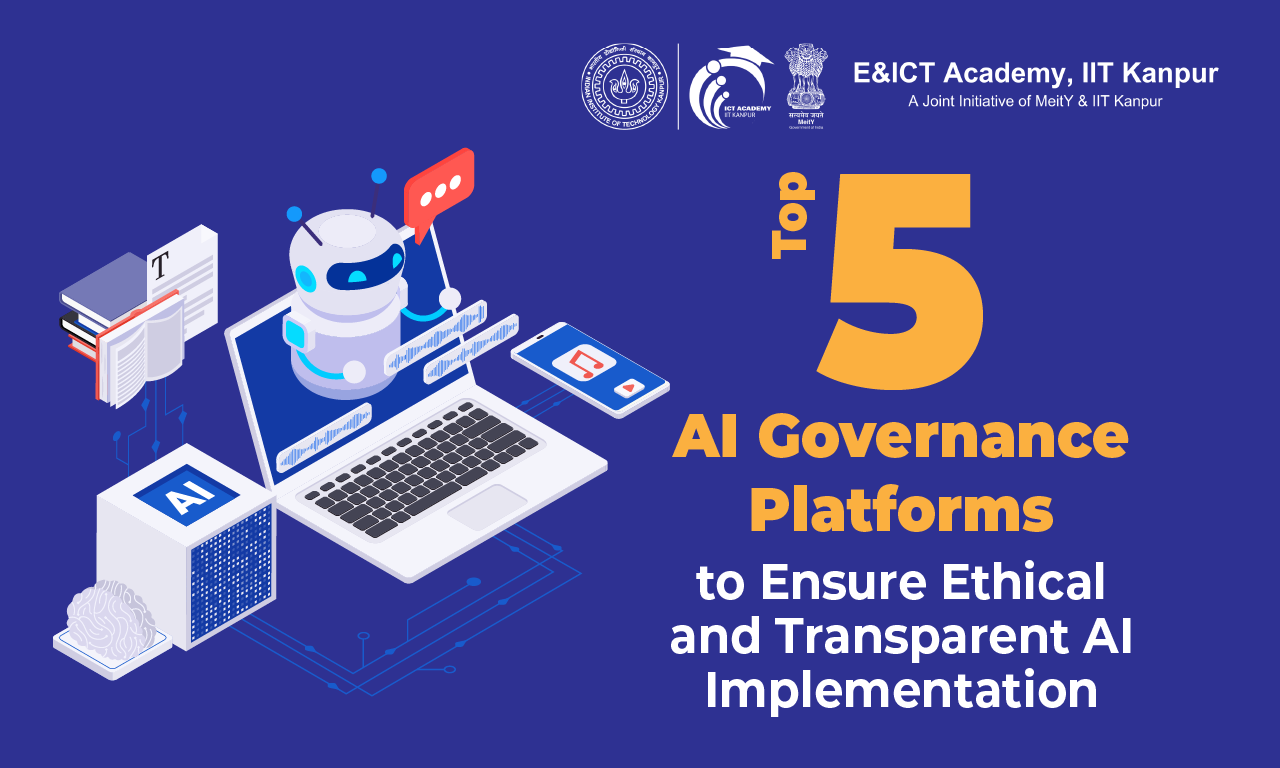Top 5 AI Governance Platforms to Ensure Ethical and Transparent AI Implementation

AI Governance Platforms
The importance of ethical AI governance has never been greater as the application of artificial intelligence (AI) continues to grow across industries. There are serious concerns regarding accountability, transparency, and justice as a result of the quick incorporation of AI technologies into daily operations.
According to a recent McKinsey analysis, only 25% of multinational corporations have put suitable governance structures in place to reduce related risks, even though 65% of them have integrated AI into core operations. By creating explicit guidelines for AI behavior and guaranteeing that AI systems are developed and run in an ethical and transparent manner, effective governance builds public confidence in AI systems and improves trust and accountability.
This article examines the significance of AI governance models, provides a definition of AI governance, and evaluates the top five platforms that support the implementation of AI in a morally and openly responsible manner.
What is AI Governance?
AI governance can simply be understood as extensive frameworks set up to supervise the working of AI systems. It ensures that the system is designed in a way to facilitate an ethical and responsible way of working. These frameworks consist of laws, rules, and supervision processes designed to ensure that AI systems are safe, fair, and compliant with the law. Stakeholder trust is increased when decision-making procedures are transparent, enabling people to comprehend how algorithms work and make judgments. AI must be used ethically to prevent prejudice, invasions of privacy, and discriminatory actions.
Ethical guidelines for implementation, transparency measures that record the operation of AI systems, accountability mechanisms for tracking down the origin of problems, and compliance management tools to comply with laws like GDPR are all essential components of an efficient AI governance framework. Together, these elements guarantee that AI systems are consistent with societal norms while keeping in mind the risks of bias and privacy concerns.
The Growing Importance of AI and Learning Opportunities
As AI continues to revolutionize industries, its importance in shaping modern technology and decision-making cannot be overstated. From healthcare to finance and education to automation, AI has transformed business operations and personal experiences. To stay ahead in this AI-driven world, professionals must upgrade their skills in AI and machine learning. EICT Academy, IIT Kanpur offers one of the best AI and machine learning courses, providing comprehensive knowledge and hands-on training to help individuals build expertise in AI technologies.
To meet this demand, the EICT Academy, IIT Kanpur, offers a comprehensive Professional Certificate Course in AI and Machine Learning. This course is designed to equip learners with the knowledge and skills needed to excel in the field of AI, covering topics such as machine learning algorithms, deep learning, natural language processing, and ethical AI practices. Whether you’re a beginner or an experienced professional, this course provides the perfect opportunity to upskill and stay ahead in the rapidly evolving world of AI.
How to Choose the Right Governance AI Platforms?
Organizations should take into account several factors when choosing an AI governance platform:
- Evaluate the needs and goals of the organization: Establish clear objectives for putting an AI governance framework into practice.
- Examine the features and capabilities of the platform: Seek out resources that facilitate risk assessment, compliance, and monitoring.
- Examine adherence to rules and moral principles: Verify that the platform complies with current legal requirements and moral standards.
- The significance of integration and scalability: Select a platform that can easily interface with current systems and expand with your company.
Let’s look into some top AI governance platforms which might fit your requirements.
Also Read: Top AI Techniques in 2025
Top 5 AI Governance Platforms
Responsible AI Dashboard by Microsoft
One powerful tool for keeping an eye on and controlling AI systems is Microsoft’s Responsible AI Dashboard. Data scientists can undertake comprehensive evaluations and spot inconsistencies because it integrates features, including error analysis, fairness assessment, and model performance evaluation, into a single interface.
The platform places a strong emphasis on accountability, openness, and fairness. By ensuring that AI systems do not adversely impact any demographic group disproportionately, tools like Fairlearn for fairness assessment promote stakeholder trust and ethical behavior.
Watson X.governance by IBM
Watson X.governance from IBM provides a whole suite of tools for handling the whole AI lifecycle. It offers crucial resources for managing AI projects from conception to implementation, together with an intuitive interface that streamlines intricate governance procedures.
Also Read: Agentic AI vs Generative AI: The Complete Difference
By promoting explainability and bias prevention, Watson X.governance guarantees regulatory compliance, which makes it a priceless tool for businesses looking to uphold moral principles. Its uses are found in sectors where comprehending model decisions is essential, such as healthcare and finance.
Google Vertex AI
An integrated platform for creating and implementing machine learning models, Google Vertex AI has earned its status as one of the best AI governance platforms to date. It provides a set of technologies that guarantee strong governance procedures while streamlining development.
Through Google’s Explainable AI capabilities, the platform encourages transparency and aids consumers in understanding model predictions. Google Vertex AI facilitates comprehensive audits of models, which increases stakeholder trust.
Salesforce Einstein
For the adoption of ethical AI in customer relationship management (CRM) systems, Salesforce Einstein comes with built-in governance features. It prioritizes data protection and ethical data use while concentrating on improving the user experience.
Einstein enhances customer relationship management by ensuring adherence to data protection laws and providing individualized experiences. By using transparent data practices, this integration increases operational efficiency and fosters client trust.
AWS AI Governance Solutions
Through its AWS AI Governance Solutions, AWS provides frameworks for risk assessment, compliance monitoring, and general AI system governance. These technologies assist businesses in efficiently managing their AI projects while abiding by legal requirements.
By utilizing cloud capabilities for scalable governance procedures, AWS solutions assist businesses in upholding regulatory compliance. Organizations can prioritize ethical issues, evaluate the risks associated with their AI deployments, and regularly monitor compliance.
Conclusion
Platforms for artificial intelligence governance are crucial for ensuring moral behavior when using AI technologies. Organizations can reduce the dangers of biases, privacy violations, and other ethical issues by putting strong governance frameworks in place.
The platforms under discussion—AWS solutions, Google Vertex AI, IBM Watson governance, Salesforce Einstein, and Microsoft’s Responsible AI Dashboard—all provide special capabilities designed to improve accountability and transparency in their respective fields.
Developing a transparent culture will be essential to gaining the public’s trust as we move to the future of AI governance. In order to match their operations with social norms and to comply with rules, organizations must give ethical issues top priority. They can easily capitalize on artificial intelligence’s transformational promise while protecting against its inherent risks by putting proper governance structures in place.
Recommended Courses

Advanced Penetration Testing and Exploitation

CISSP - Introduction to Information Security

Cloud Security Practitioner

Cyber Security

Digital Forensics and Incident Investigation

Ethical Hacking Essentials

Ethical Hacking For Beginners

Gen AI in Cyber Security

Introduction to Cryptography for Beginners

Introduction to Cybercrime

Advanced Certificate Program in AI for Leaders

AI & Digital Transformation

AI for Machine Learning: Foundations to Frontier Application

AI Product Leadership Program

Deep Learning with Generative AI for Computer Vision

Generative AI Course

Machine Learning with Python

Professional Certificate Course in Generative AI and Machine Learning

Professional Certificate Program in Leadership with AI



